EDU30011: Essay on the Role of Science Education in Skill Development
VerifiedAdded on 2021/05/10
|7
|1898
|434
Essay
AI Summary
This essay explores the critical role of science education in fostering 21st-century skills, emphasizing collaboration, critical thinking, creativity, and problem-solving. It highlights the relevance of science in the real world, the development of scientific thinking, and the importance of the Australian Curriculum (ACARA) in providing opportunities for students to enhance their understanding of science concepts. The essay discusses the significance of skills like critical thinking, innovation, and decision-making, and the educator's role in connecting science to real-world issues and creating a positive learning environment. It also emphasizes the impact of educators' attitudes on students' perception of science and the importance of scientific literacy in the digital age. The essay concludes by reiterating the essential role of science education in equipping students with skills applicable in various real-world situations and the need for educators to present science with positive attitudes to inspire a passion for science.
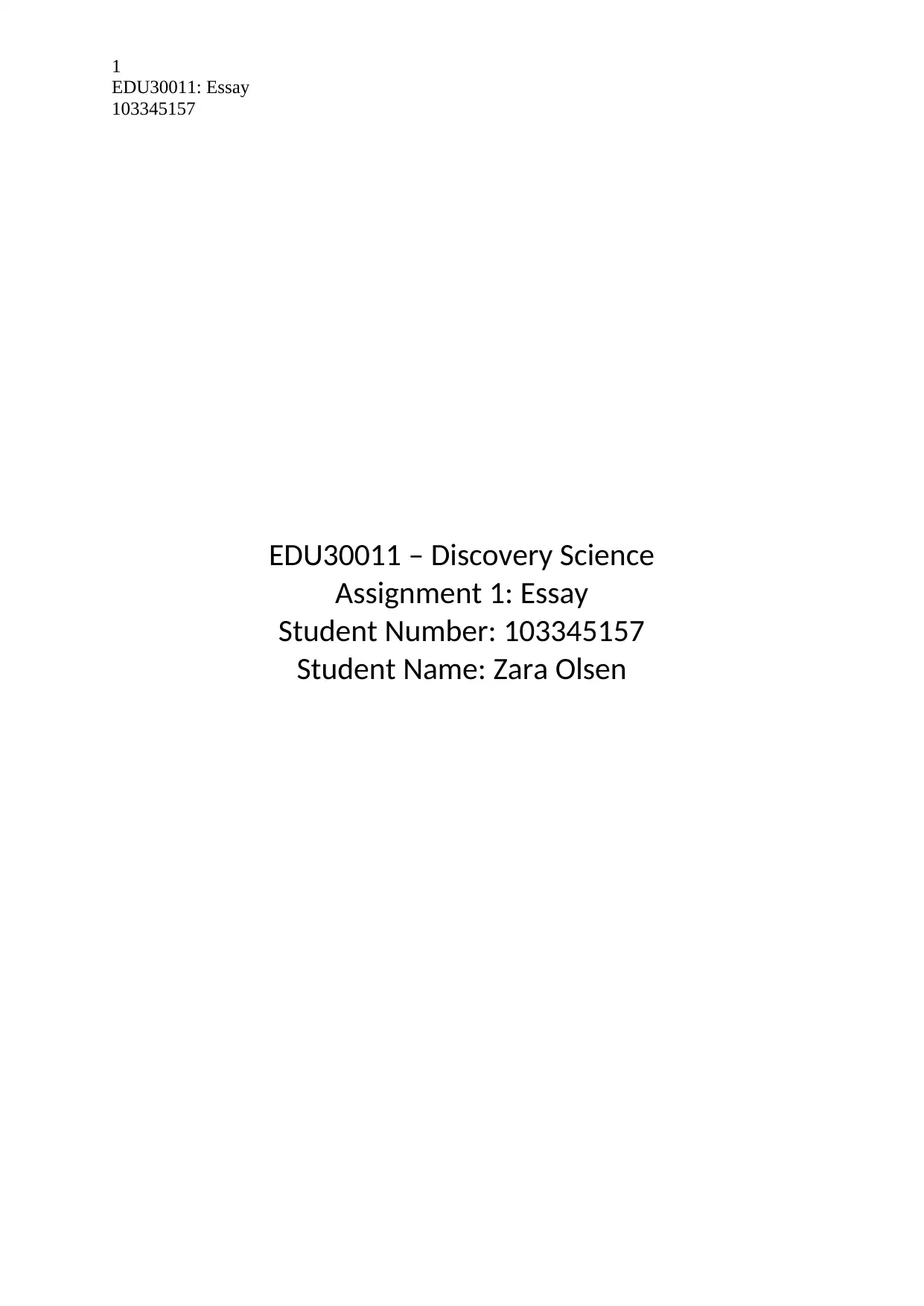
1
EDU30011: Essay
103345157
EDU30011 – Discovery Science
Assignment 1: Essay
Student Number: 103345157
Student Name: Zara Olsen
EDU30011: Essay
103345157
EDU30011 – Discovery Science
Assignment 1: Essay
Student Number: 103345157
Student Name: Zara Olsen
Paraphrase This Document
Need a fresh take? Get an instant paraphrase of this document with our AI Paraphraser
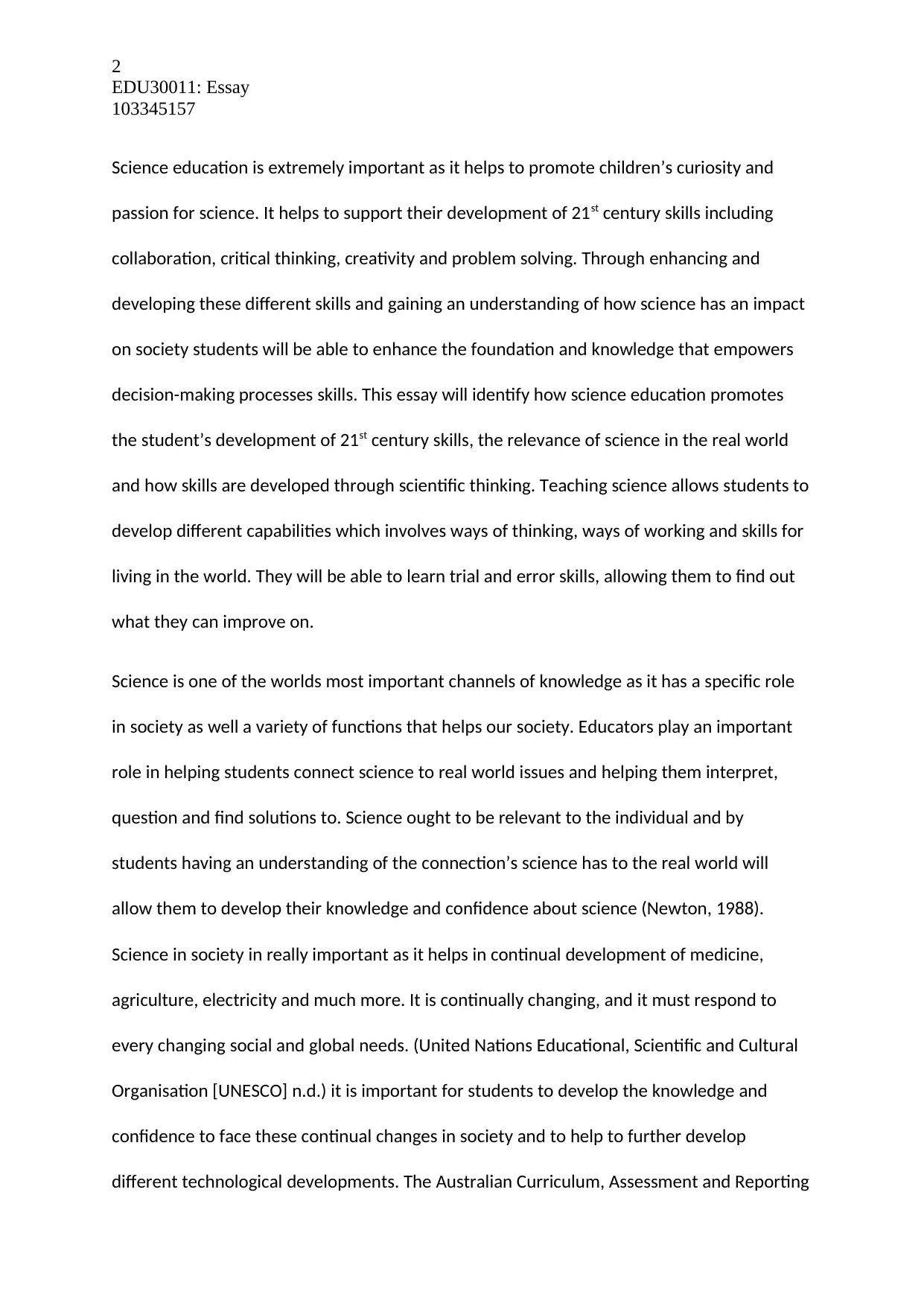
2
EDU30011: Essay
103345157
Science education is extremely important as it helps to promote children’s curiosity and
passion for science. It helps to support their development of 21st century skills including
collaboration, critical thinking, creativity and problem solving. Through enhancing and
developing these different skills and gaining an understanding of how science has an impact
on society students will be able to enhance the foundation and knowledge that empowers
decision-making processes skills. This essay will identify how science education promotes
the student’s development of 21st century skills, the relevance of science in the real world
and how skills are developed through scientific thinking. Teaching science allows students to
develop different capabilities which involves ways of thinking, ways of working and skills for
living in the world. They will be able to learn trial and error skills, allowing them to find out
what they can improve on.
Science is one of the worlds most important channels of knowledge as it has a specific role
in society as well a variety of functions that helps our society. Educators play an important
role in helping students connect science to real world issues and helping them interpret,
question and find solutions to. Science ought to be relevant to the individual and by
students having an understanding of the connection’s science has to the real world will
allow them to develop their knowledge and confidence about science (Newton, 1988).
Science in society in really important as it helps in continual development of medicine,
agriculture, electricity and much more. It is continually changing, and it must respond to
every changing social and global needs. (United Nations Educational, Scientific and Cultural
Organisation [UNESCO] n.d.) it is important for students to develop the knowledge and
confidence to face these continual changes in society and to help to further develop
different technological developments. The Australian Curriculum, Assessment and Reporting
EDU30011: Essay
103345157
Science education is extremely important as it helps to promote children’s curiosity and
passion for science. It helps to support their development of 21st century skills including
collaboration, critical thinking, creativity and problem solving. Through enhancing and
developing these different skills and gaining an understanding of how science has an impact
on society students will be able to enhance the foundation and knowledge that empowers
decision-making processes skills. This essay will identify how science education promotes
the student’s development of 21st century skills, the relevance of science in the real world
and how skills are developed through scientific thinking. Teaching science allows students to
develop different capabilities which involves ways of thinking, ways of working and skills for
living in the world. They will be able to learn trial and error skills, allowing them to find out
what they can improve on.
Science is one of the worlds most important channels of knowledge as it has a specific role
in society as well a variety of functions that helps our society. Educators play an important
role in helping students connect science to real world issues and helping them interpret,
question and find solutions to. Science ought to be relevant to the individual and by
students having an understanding of the connection’s science has to the real world will
allow them to develop their knowledge and confidence about science (Newton, 1988).
Science in society in really important as it helps in continual development of medicine,
agriculture, electricity and much more. It is continually changing, and it must respond to
every changing social and global needs. (United Nations Educational, Scientific and Cultural
Organisation [UNESCO] n.d.) it is important for students to develop the knowledge and
confidence to face these continual changes in society and to help to further develop
different technological developments. The Australian Curriculum, Assessment and Reporting
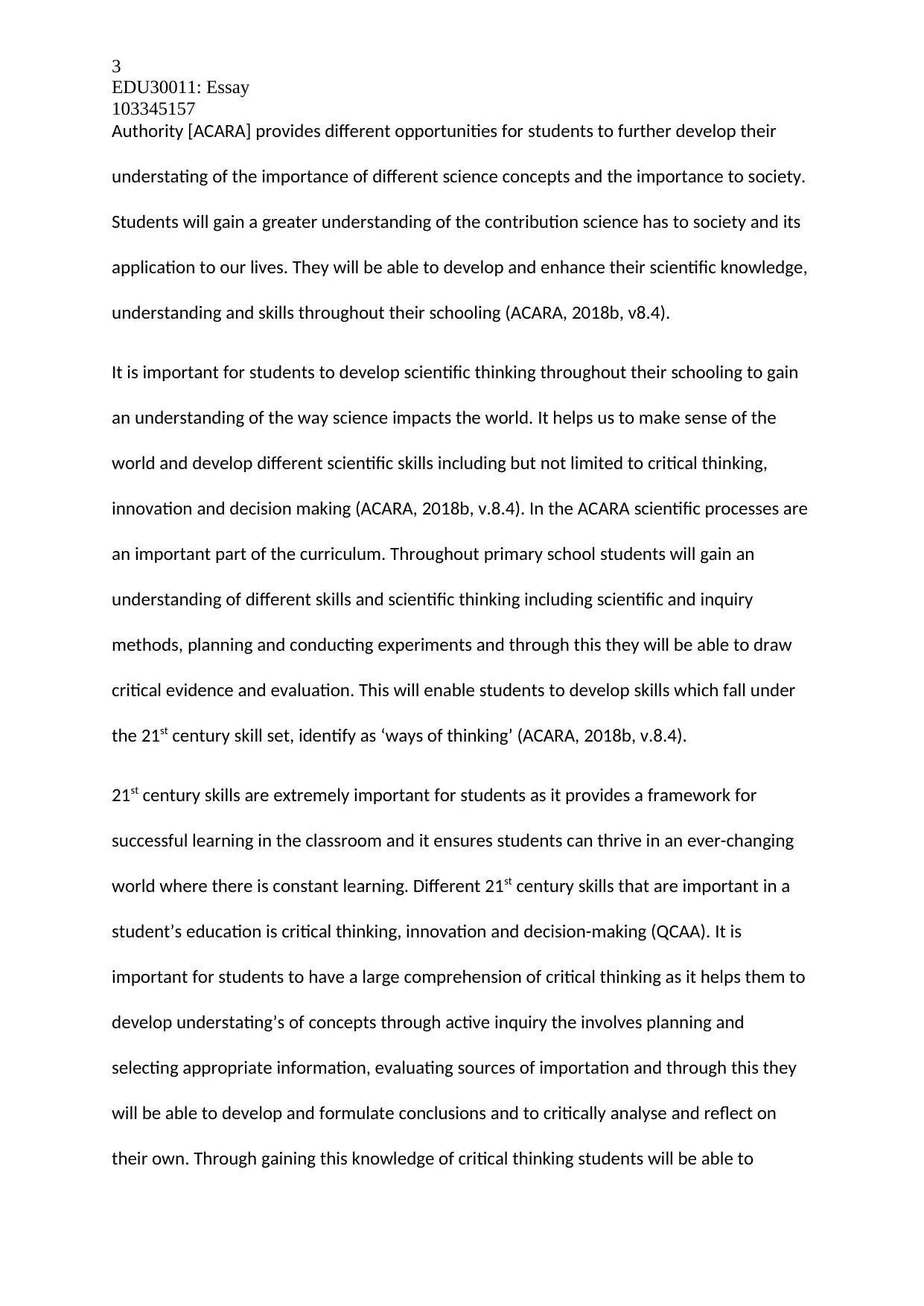
3
EDU30011: Essay
103345157
Authority [ACARA] provides different opportunities for students to further develop their
understating of the importance of different science concepts and the importance to society.
Students will gain a greater understanding of the contribution science has to society and its
application to our lives. They will be able to develop and enhance their scientific knowledge,
understanding and skills throughout their schooling (ACARA, 2018b, v8.4).
It is important for students to develop scientific thinking throughout their schooling to gain
an understanding of the way science impacts the world. It helps us to make sense of the
world and develop different scientific skills including but not limited to critical thinking,
innovation and decision making (ACARA, 2018b, v.8.4). In the ACARA scientific processes are
an important part of the curriculum. Throughout primary school students will gain an
understanding of different skills and scientific thinking including scientific and inquiry
methods, planning and conducting experiments and through this they will be able to draw
critical evidence and evaluation. This will enable students to develop skills which fall under
the 21st century skill set, identify as ‘ways of thinking’ (ACARA, 2018b, v.8.4).
21st century skills are extremely important for students as it provides a framework for
successful learning in the classroom and it ensures students can thrive in an ever-changing
world where there is constant learning. Different 21st century skills that are important in a
student’s education is critical thinking, innovation and decision-making (QCAA). It is
important for students to have a large comprehension of critical thinking as it helps them to
develop understating’s of concepts through active inquiry the involves planning and
selecting appropriate information, evaluating sources of importation and through this they
will be able to develop and formulate conclusions and to critically analyse and reflect on
their own. Through gaining this knowledge of critical thinking students will be able to
EDU30011: Essay
103345157
Authority [ACARA] provides different opportunities for students to further develop their
understating of the importance of different science concepts and the importance to society.
Students will gain a greater understanding of the contribution science has to society and its
application to our lives. They will be able to develop and enhance their scientific knowledge,
understanding and skills throughout their schooling (ACARA, 2018b, v8.4).
It is important for students to develop scientific thinking throughout their schooling to gain
an understanding of the way science impacts the world. It helps us to make sense of the
world and develop different scientific skills including but not limited to critical thinking,
innovation and decision making (ACARA, 2018b, v.8.4). In the ACARA scientific processes are
an important part of the curriculum. Throughout primary school students will gain an
understanding of different skills and scientific thinking including scientific and inquiry
methods, planning and conducting experiments and through this they will be able to draw
critical evidence and evaluation. This will enable students to develop skills which fall under
the 21st century skill set, identify as ‘ways of thinking’ (ACARA, 2018b, v.8.4).
21st century skills are extremely important for students as it provides a framework for
successful learning in the classroom and it ensures students can thrive in an ever-changing
world where there is constant learning. Different 21st century skills that are important in a
student’s education is critical thinking, innovation and decision-making (QCAA). It is
important for students to have a large comprehension of critical thinking as it helps them to
develop understating’s of concepts through active inquiry the involves planning and
selecting appropriate information, evaluating sources of importation and through this they
will be able to develop and formulate conclusions and to critically analyse and reflect on
their own. Through gaining this knowledge of critical thinking students will be able to
⊘ This is a preview!⊘
Do you want full access?
Subscribe today to unlock all pages.

Trusted by 1+ million students worldwide
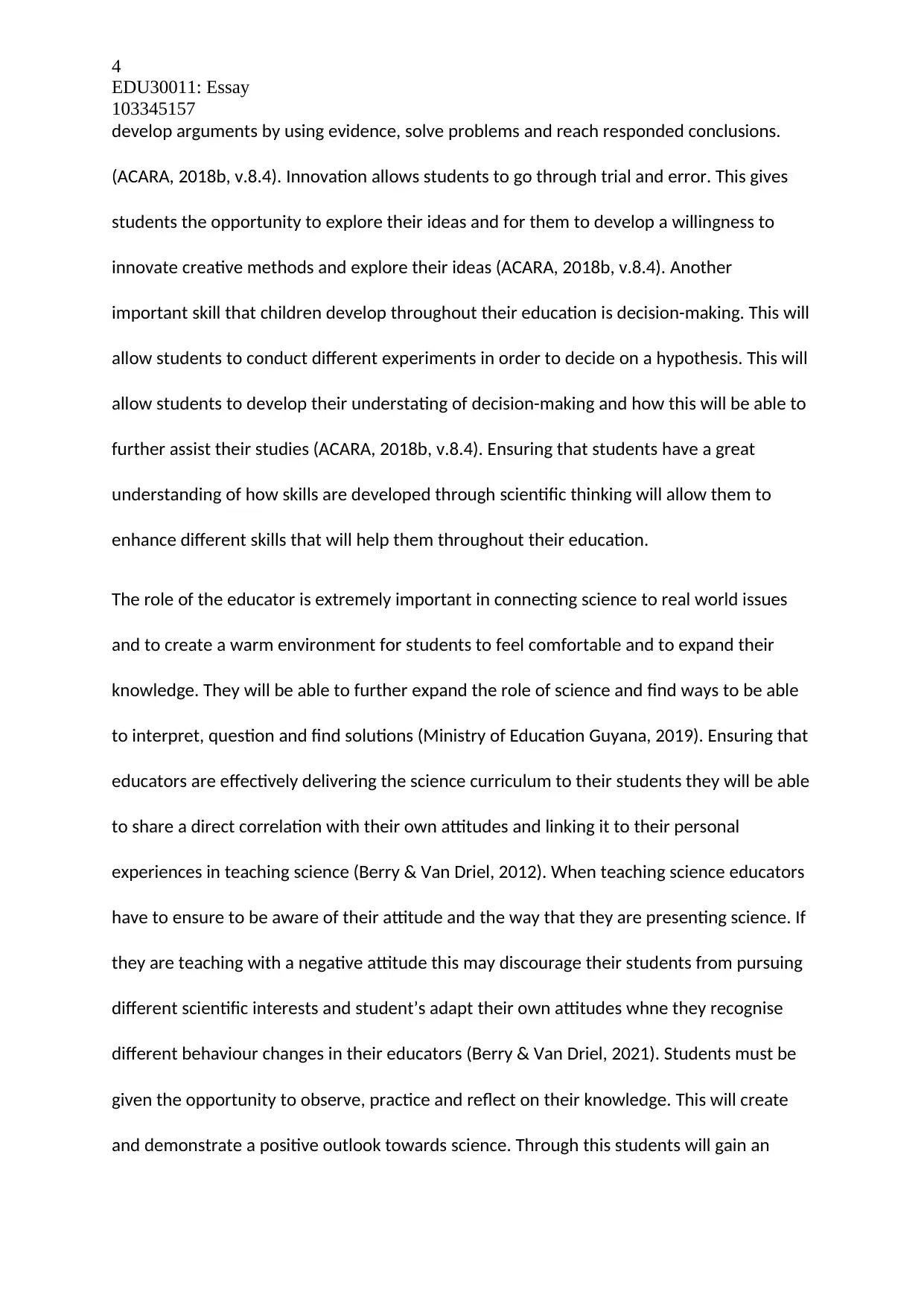
4
EDU30011: Essay
103345157
develop arguments by using evidence, solve problems and reach responded conclusions.
(ACARA, 2018b, v.8.4). Innovation allows students to go through trial and error. This gives
students the opportunity to explore their ideas and for them to develop a willingness to
innovate creative methods and explore their ideas (ACARA, 2018b, v.8.4). Another
important skill that children develop throughout their education is decision-making. This will
allow students to conduct different experiments in order to decide on a hypothesis. This will
allow students to develop their understating of decision-making and how this will be able to
further assist their studies (ACARA, 2018b, v.8.4). Ensuring that students have a great
understanding of how skills are developed through scientific thinking will allow them to
enhance different skills that will help them throughout their education.
The role of the educator is extremely important in connecting science to real world issues
and to create a warm environment for students to feel comfortable and to expand their
knowledge. They will be able to further expand the role of science and find ways to be able
to interpret, question and find solutions (Ministry of Education Guyana, 2019). Ensuring that
educators are effectively delivering the science curriculum to their students they will be able
to share a direct correlation with their own attitudes and linking it to their personal
experiences in teaching science (Berry & Van Driel, 2012). When teaching science educators
have to ensure to be aware of their attitude and the way that they are presenting science. If
they are teaching with a negative attitude this may discourage their students from pursuing
different scientific interests and student’s adapt their own attitudes whne they recognise
different behaviour changes in their educators (Berry & Van Driel, 2021). Students must be
given the opportunity to observe, practice and reflect on their knowledge. This will create
and demonstrate a positive outlook towards science. Through this students will gain an
EDU30011: Essay
103345157
develop arguments by using evidence, solve problems and reach responded conclusions.
(ACARA, 2018b, v.8.4). Innovation allows students to go through trial and error. This gives
students the opportunity to explore their ideas and for them to develop a willingness to
innovate creative methods and explore their ideas (ACARA, 2018b, v.8.4). Another
important skill that children develop throughout their education is decision-making. This will
allow students to conduct different experiments in order to decide on a hypothesis. This will
allow students to develop their understating of decision-making and how this will be able to
further assist their studies (ACARA, 2018b, v.8.4). Ensuring that students have a great
understanding of how skills are developed through scientific thinking will allow them to
enhance different skills that will help them throughout their education.
The role of the educator is extremely important in connecting science to real world issues
and to create a warm environment for students to feel comfortable and to expand their
knowledge. They will be able to further expand the role of science and find ways to be able
to interpret, question and find solutions (Ministry of Education Guyana, 2019). Ensuring that
educators are effectively delivering the science curriculum to their students they will be able
to share a direct correlation with their own attitudes and linking it to their personal
experiences in teaching science (Berry & Van Driel, 2012). When teaching science educators
have to ensure to be aware of their attitude and the way that they are presenting science. If
they are teaching with a negative attitude this may discourage their students from pursuing
different scientific interests and student’s adapt their own attitudes whne they recognise
different behaviour changes in their educators (Berry & Van Driel, 2021). Students must be
given the opportunity to observe, practice and reflect on their knowledge. This will create
and demonstrate a positive outlook towards science. Through this students will gain an
Paraphrase This Document
Need a fresh take? Get an instant paraphrase of this document with our AI Paraphraser
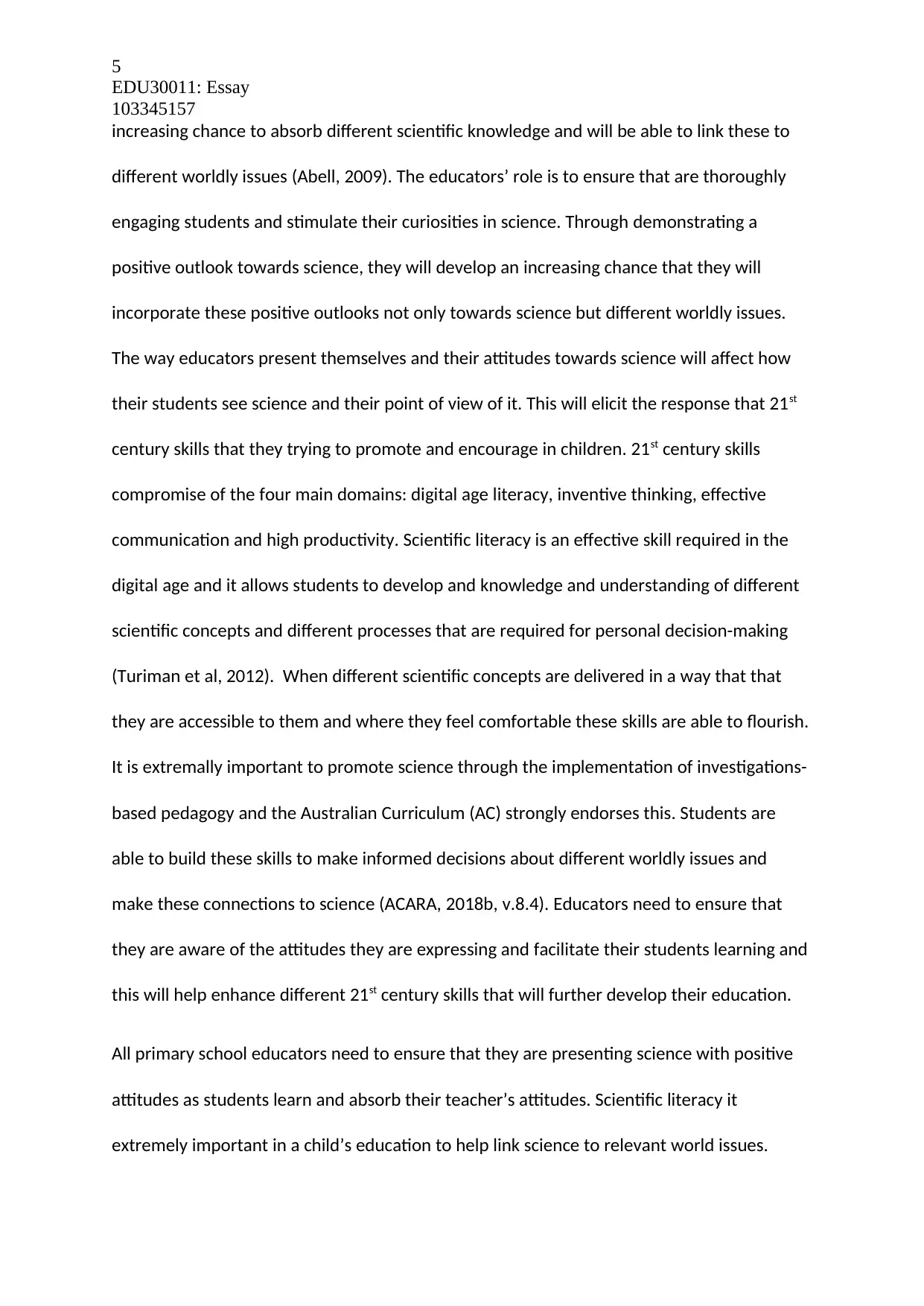
5
EDU30011: Essay
103345157
increasing chance to absorb different scientific knowledge and will be able to link these to
different worldly issues (Abell, 2009). The educators’ role is to ensure that are thoroughly
engaging students and stimulate their curiosities in science. Through demonstrating a
positive outlook towards science, they will develop an increasing chance that they will
incorporate these positive outlooks not only towards science but different worldly issues.
The way educators present themselves and their attitudes towards science will affect how
their students see science and their point of view of it. This will elicit the response that 21st
century skills that they trying to promote and encourage in children. 21st century skills
compromise of the four main domains: digital age literacy, inventive thinking, effective
communication and high productivity. Scientific literacy is an effective skill required in the
digital age and it allows students to develop and knowledge and understanding of different
scientific concepts and different processes that are required for personal decision-making
(Turiman et al, 2012). When different scientific concepts are delivered in a way that that
they are accessible to them and where they feel comfortable these skills are able to flourish.
It is extremally important to promote science through the implementation of investigations-
based pedagogy and the Australian Curriculum (AC) strongly endorses this. Students are
able to build these skills to make informed decisions about different worldly issues and
make these connections to science (ACARA, 2018b, v.8.4). Educators need to ensure that
they are aware of the attitudes they are expressing and facilitate their students learning and
this will help enhance different 21st century skills that will further develop their education.
All primary school educators need to ensure that they are presenting science with positive
attitudes as students learn and absorb their teacher’s attitudes. Scientific literacy it
extremely important in a child’s education to help link science to relevant world issues.
EDU30011: Essay
103345157
increasing chance to absorb different scientific knowledge and will be able to link these to
different worldly issues (Abell, 2009). The educators’ role is to ensure that are thoroughly
engaging students and stimulate their curiosities in science. Through demonstrating a
positive outlook towards science, they will develop an increasing chance that they will
incorporate these positive outlooks not only towards science but different worldly issues.
The way educators present themselves and their attitudes towards science will affect how
their students see science and their point of view of it. This will elicit the response that 21st
century skills that they trying to promote and encourage in children. 21st century skills
compromise of the four main domains: digital age literacy, inventive thinking, effective
communication and high productivity. Scientific literacy is an effective skill required in the
digital age and it allows students to develop and knowledge and understanding of different
scientific concepts and different processes that are required for personal decision-making
(Turiman et al, 2012). When different scientific concepts are delivered in a way that that
they are accessible to them and where they feel comfortable these skills are able to flourish.
It is extremally important to promote science through the implementation of investigations-
based pedagogy and the Australian Curriculum (AC) strongly endorses this. Students are
able to build these skills to make informed decisions about different worldly issues and
make these connections to science (ACARA, 2018b, v.8.4). Educators need to ensure that
they are aware of the attitudes they are expressing and facilitate their students learning and
this will help enhance different 21st century skills that will further develop their education.
All primary school educators need to ensure that they are presenting science with positive
attitudes as students learn and absorb their teacher’s attitudes. Scientific literacy it
extremely important in a child’s education to help link science to relevant world issues.
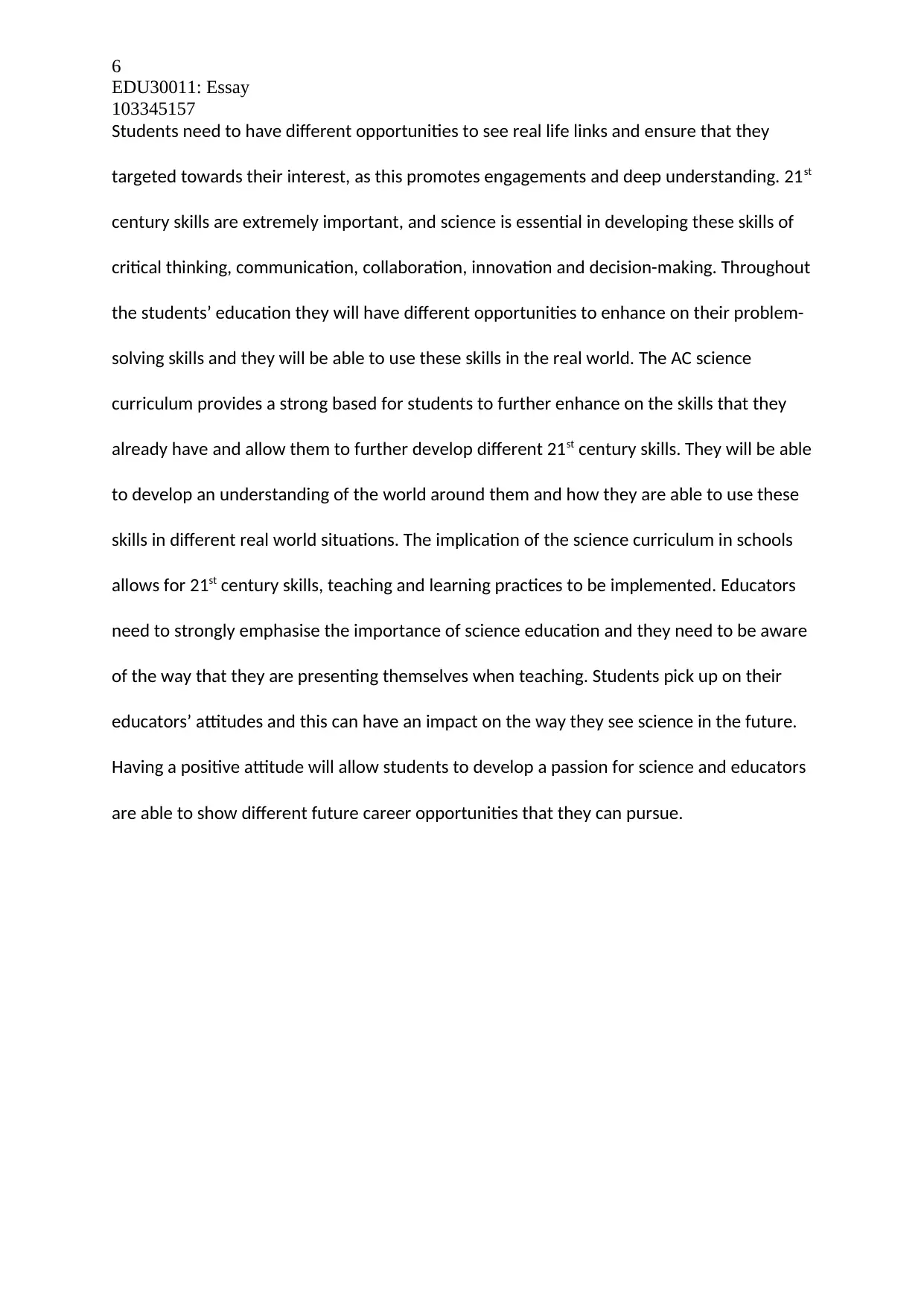
6
EDU30011: Essay
103345157
Students need to have different opportunities to see real life links and ensure that they
targeted towards their interest, as this promotes engagements and deep understanding. 21st
century skills are extremely important, and science is essential in developing these skills of
critical thinking, communication, collaboration, innovation and decision-making. Throughout
the students’ education they will have different opportunities to enhance on their problem-
solving skills and they will be able to use these skills in the real world. The AC science
curriculum provides a strong based for students to further enhance on the skills that they
already have and allow them to further develop different 21st century skills. They will be able
to develop an understanding of the world around them and how they are able to use these
skills in different real world situations. The implication of the science curriculum in schools
allows for 21st century skills, teaching and learning practices to be implemented. Educators
need to strongly emphasise the importance of science education and they need to be aware
of the way that they are presenting themselves when teaching. Students pick up on their
educators’ attitudes and this can have an impact on the way they see science in the future.
Having a positive attitude will allow students to develop a passion for science and educators
are able to show different future career opportunities that they can pursue.
EDU30011: Essay
103345157
Students need to have different opportunities to see real life links and ensure that they
targeted towards their interest, as this promotes engagements and deep understanding. 21st
century skills are extremely important, and science is essential in developing these skills of
critical thinking, communication, collaboration, innovation and decision-making. Throughout
the students’ education they will have different opportunities to enhance on their problem-
solving skills and they will be able to use these skills in the real world. The AC science
curriculum provides a strong based for students to further enhance on the skills that they
already have and allow them to further develop different 21st century skills. They will be able
to develop an understanding of the world around them and how they are able to use these
skills in different real world situations. The implication of the science curriculum in schools
allows for 21st century skills, teaching and learning practices to be implemented. Educators
need to strongly emphasise the importance of science education and they need to be aware
of the way that they are presenting themselves when teaching. Students pick up on their
educators’ attitudes and this can have an impact on the way they see science in the future.
Having a positive attitude will allow students to develop a passion for science and educators
are able to show different future career opportunities that they can pursue.
⊘ This is a preview!⊘
Do you want full access?
Subscribe today to unlock all pages.

Trusted by 1+ million students worldwide
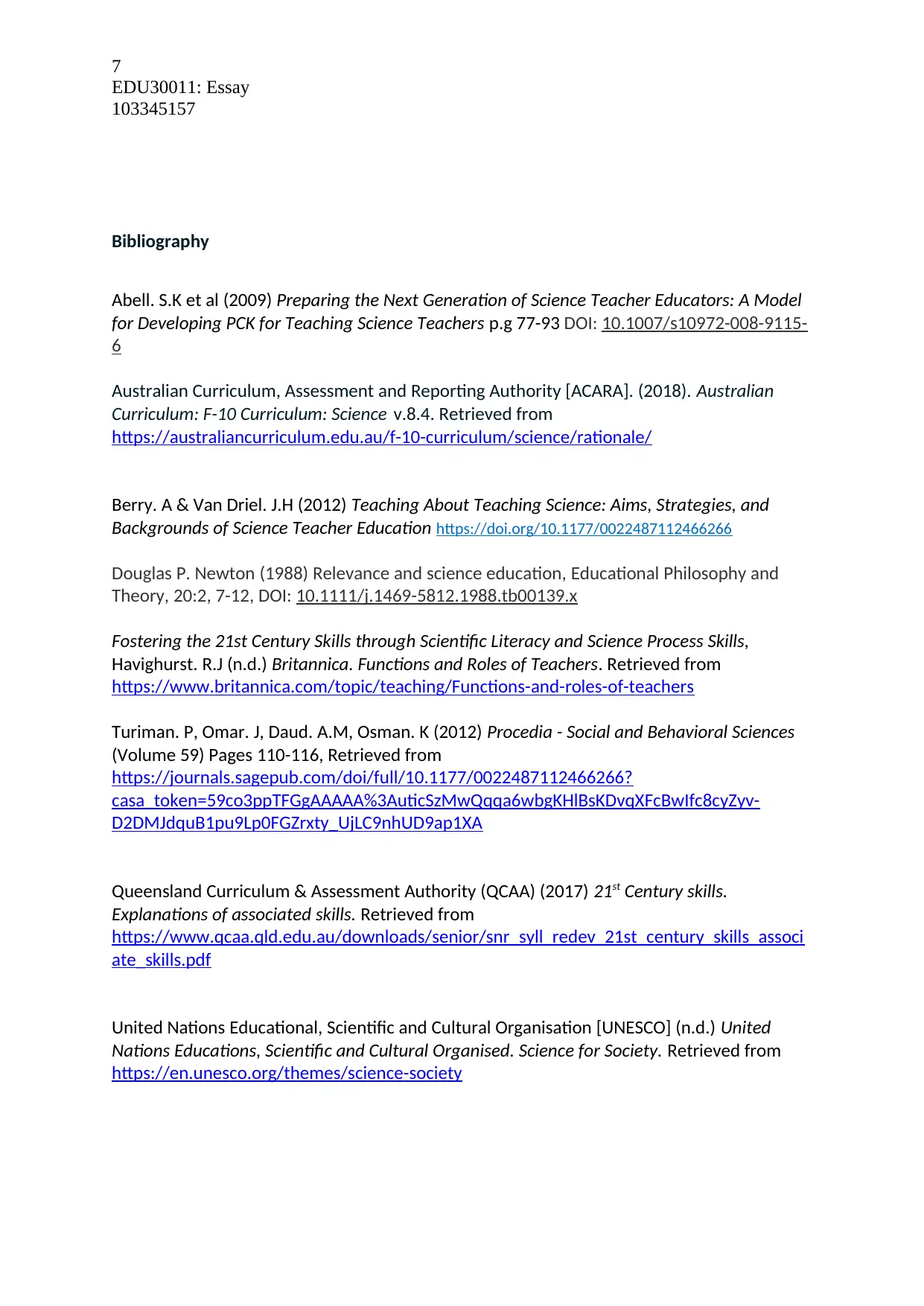
7
EDU30011: Essay
103345157
Bibliography
Abell. S.K et al (2009) Preparing the Next Generation of Science Teacher Educators: A Model
for Developing PCK for Teaching Science Teachers p.g 77-93 DOI: 10.1007/s10972-008-9115-
6
Australian Curriculum, Assessment and Reporting Authority [ACARA]. (2018). Australian
Curriculum: F-10 Curriculum: Science v.8.4. Retrieved from
https://australiancurriculum.edu.au/f-10-curriculum/science/rationale/
Berry. A & Van Driel. J.H (2012) Teaching About Teaching Science: Aims, Strategies, and
Backgrounds of Science Teacher Education https://doi.org/10.1177/0022487112466266
Douglas P. Newton (1988) Relevance and science education, Educational Philosophy and
Theory, 20:2, 7-12, DOI: 10.1111/j.1469-5812.1988.tb00139.x
Fostering the 21st Century Skills through Scientific Literacy and Science Process Skills,
Havighurst. R.J (n.d.) Britannica. Functions and Roles of Teachers. Retrieved from
https://www.britannica.com/topic/teaching/Functions-and-roles-of-teachers
Turiman. P, Omar. J, Daud. A.M, Osman. K (2012) Procedia - Social and Behavioral Sciences
(Volume 59) Pages 110-116, Retrieved from
https://journals.sagepub.com/doi/full/10.1177/0022487112466266?
casa_token=59co3ppTFGgAAAAA%3AuticSzMwQqqa6wbgKHlBsKDvqXFcBwIfc8cyZyv-
D2DMJdquB1pu9Lp0FGZrxty_UjLC9nhUD9ap1XA
Queensland Curriculum & Assessment Authority (QCAA) (2017) 21st Century skills.
Explanations of associated skills. Retrieved from
https://www.qcaa.qld.edu.au/downloads/senior/snr_syll_redev_21st_century_skills_associ
ate_skills.pdf
United Nations Educational, Scientific and Cultural Organisation [UNESCO] (n.d.) United
Nations Educations, Scientific and Cultural Organised. Science for Society. Retrieved from
https://en.unesco.org/themes/science-society
EDU30011: Essay
103345157
Bibliography
Abell. S.K et al (2009) Preparing the Next Generation of Science Teacher Educators: A Model
for Developing PCK for Teaching Science Teachers p.g 77-93 DOI: 10.1007/s10972-008-9115-
6
Australian Curriculum, Assessment and Reporting Authority [ACARA]. (2018). Australian
Curriculum: F-10 Curriculum: Science v.8.4. Retrieved from
https://australiancurriculum.edu.au/f-10-curriculum/science/rationale/
Berry. A & Van Driel. J.H (2012) Teaching About Teaching Science: Aims, Strategies, and
Backgrounds of Science Teacher Education https://doi.org/10.1177/0022487112466266
Douglas P. Newton (1988) Relevance and science education, Educational Philosophy and
Theory, 20:2, 7-12, DOI: 10.1111/j.1469-5812.1988.tb00139.x
Fostering the 21st Century Skills through Scientific Literacy and Science Process Skills,
Havighurst. R.J (n.d.) Britannica. Functions and Roles of Teachers. Retrieved from
https://www.britannica.com/topic/teaching/Functions-and-roles-of-teachers
Turiman. P, Omar. J, Daud. A.M, Osman. K (2012) Procedia - Social and Behavioral Sciences
(Volume 59) Pages 110-116, Retrieved from
https://journals.sagepub.com/doi/full/10.1177/0022487112466266?
casa_token=59co3ppTFGgAAAAA%3AuticSzMwQqqa6wbgKHlBsKDvqXFcBwIfc8cyZyv-
D2DMJdquB1pu9Lp0FGZrxty_UjLC9nhUD9ap1XA
Queensland Curriculum & Assessment Authority (QCAA) (2017) 21st Century skills.
Explanations of associated skills. Retrieved from
https://www.qcaa.qld.edu.au/downloads/senior/snr_syll_redev_21st_century_skills_associ
ate_skills.pdf
United Nations Educational, Scientific and Cultural Organisation [UNESCO] (n.d.) United
Nations Educations, Scientific and Cultural Organised. Science for Society. Retrieved from
https://en.unesco.org/themes/science-society
1 out of 7
Related Documents
Your All-in-One AI-Powered Toolkit for Academic Success.
+13062052269
info@desklib.com
Available 24*7 on WhatsApp / Email
![[object Object]](/_next/static/media/star-bottom.7253800d.svg)
Unlock your academic potential
Copyright © 2020–2026 A2Z Services. All Rights Reserved. Developed and managed by ZUCOL.




